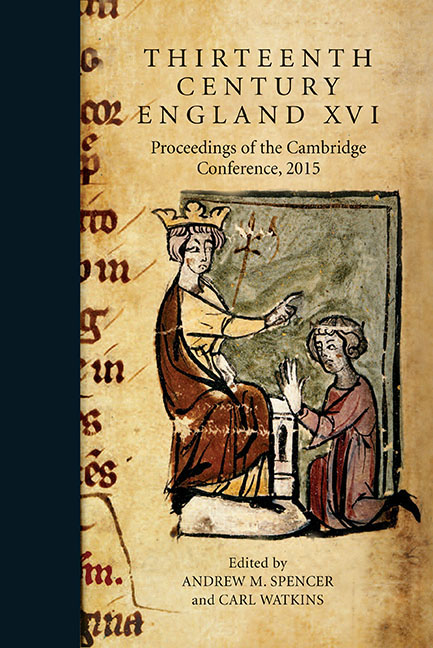Book contents
- Frontmatter
- CONTENTS
- List of Illustrations
- List of Contributors
- List of Abbreviations
- Introduction
- The Uncertainties of Reformers: Collective Anxieties and Strategic Discourses
- Moral Dilemmas in English Confessors’ Manuals
- Damnatio Eternae Mortis or Medicinalis Non Mortalis: The Ambiguities of Excommunication in Thirteenth-Century England
- The Contribution of Thomas Docking to the History of Political Thought
- Dealing with Inadequate Kingship: Uncertain Responses from Magna Carta to Deposition, 1199–1327
- The Rebel's Four Dilemmas in the Long Thirteenth Century
- The Daughters of William the Lion and Queen Ermengarde
- Simon de Montfort and the Ambiguity of Ethnicity in Thirteenth-Century Politics
- The Hue and Cry in Thirteenth-Century England
- Recalling Anglo-Scottish Relations in 1291: Historical Knowledge, Monastic Memory and the Edwardian Inquests
The Uncertainties of Reformers: Collective Anxieties and Strategic Discourses
Published online by Cambridge University Press: 23 August 2019
- Frontmatter
- CONTENTS
- List of Illustrations
- List of Contributors
- List of Abbreviations
- Introduction
- The Uncertainties of Reformers: Collective Anxieties and Strategic Discourses
- Moral Dilemmas in English Confessors’ Manuals
- Damnatio Eternae Mortis or Medicinalis Non Mortalis: The Ambiguities of Excommunication in Thirteenth-Century England
- The Contribution of Thomas Docking to the History of Political Thought
- Dealing with Inadequate Kingship: Uncertain Responses from Magna Carta to Deposition, 1199–1327
- The Rebel's Four Dilemmas in the Long Thirteenth Century
- The Daughters of William the Lion and Queen Ermengarde
- Simon de Montfort and the Ambiguity of Ethnicity in Thirteenth-Century Politics
- The Hue and Cry in Thirteenth-Century England
- Recalling Anglo-Scottish Relations in 1291: Historical Knowledge, Monastic Memory and the Edwardian Inquests
Summary
Discontent with the existing terminology, narratives and concepts of reform is widely felt among medievalists, although most of the discussion has been focused on the period from c. 800 until 1150 or, at the latest, 1200. In contrast, reform in thirteenth-century England is still generally treated as a stable conceptual category, a predominantly insular phenomenon, and as a popular activity among both laity and clergy, who, it would appear, spent much of their time either pursuing or resisting something called reform. Renewed interest in the relationships between secular and ecclesiastical reformers seems to have resulted in the convergence of previously distinct historiographies of reform: those of the kingdom's governance and of the implementation of the constitutions of Lateran IV. Since both have long been established in their separate spheres as significant instances of reform, and the terminology has not been revisited, ‘reform’ has become even more capacious and inexact in its meaning. The term reformatio is certainly present in the documents, although not necessarily with the frequency or wide scope of meaning with which it appears in translations and interpretations of those documents. Magna Carta spoke of an emendatio, not reformatio, of the kingdom, while the documents produced by the baronial ‘reformers’ used a mixture of terms to describe what ought to be done: ordino, rectifico, correctio and reformatio, and, in the vernacular, refurmement, amendement and releuement. Among ecclesiastical ‘reformers’, the use of the term was closely connected to the wording of the constitutions of Lateran IV, which spoke of reform solely as an ‘office of correction and reform’ that belonged to prelates, abbots and their assistants, who should scrutinise morals, especially those of the clergy and religious: ‘otherwise the blood of such persons will be required at their hands’. The Franciscan, Adam Marsh, usually described as a reformer, hardly used the word himself and when he did, it was in the same very restricted sense, interchangeable with emendatio, of correcting individuals. It seems likely that people who are not viewed as reformers also used this conventional language of scrutiny, discipline and improvement in a range of contexts.
- Type
- Chapter
- Information
- Thirteenth Century England XVIProceedings of the Cambridge Conference, 2015, pp. 1 - 20Publisher: Boydell & BrewerPrint publication year: 2017

